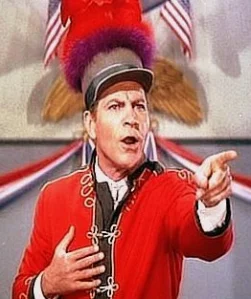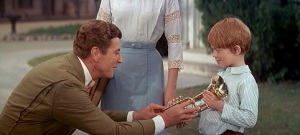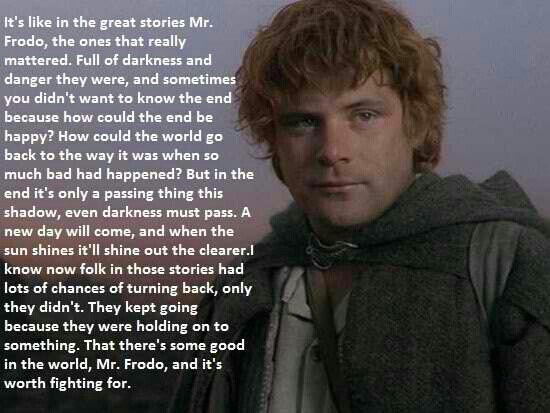Film
The Ameri-Con Man: How Harold Hill and Jay Gatsby define America

“Remember, my friends, listen to me because I pass this way but once.”
From Meredith Wilson’s Tony-winning musical The Music Man and F. Scott Fitzgerald’s perennially high-school required read The Great Gatsby spring two of the cleverest and most dapper American heroes to feature in our star-spangled tradition. Yet, the word “hero” is clearly a troubled one in these works, for both Hill and Gatsby (if we may even refer to them as such since both monikers are pseudonyms) complicate the water of conventional heroics. Undoubtedly, they enthrall their audiences, luring us all in with their smoke-and-mirrors masquerade. They are truly dazzling figures, quick-witted charlatans with magnetic appeal and magical, theatrical aplomb. Their uncanny ability to wink-and-nod through life, to deflect the truth with a carefully-timed joke, to blur unpleasant realities with enough lights and music (indeed with seventy-six trombones) to encourage the fantasy of the American dream – even if the supports have been lamed decades ago – stuns us, leaving us with just enough patriotic paralysis to miss the haunting possibility that behind the American camouflage lies a hollow and corroded void.

“They’re such beautiful shirts […] It makes me sad because I’ve never seen such beautiful shirts before.”
In this post, then, I’d like to introduce a comparison of both Hill and Gatsby as quintessential American figures, earnest and romantic heroes pursuing illusory and counterfeit means of achieving their dreams. They are pied pipers, whistling and parading the nation in an endless and indefinite march toward ever-receding hopes. Yet, they are not cruel, for they are equally caught up in the cavalcade, spirited themselves by the glittering exuberance of the red, white, and blue. In short, they represent the modern American in desperate need of spiritual redemption and salvation from the treadmill of the American dream.
- Empty Yesterdays
Much of what motivates both Harold Hill and Jay Gatsby in their construction of false identities and flashy theatrics is a settled fear of the wasted life, a molded leaf-pile of regrets and missed opportunities.
As Hill requests to meet Marian Paroo, the reticent, independent town librarian, at the footbridge for a romantic rendezvous, Marian hesitates, asking to postpone the meeting. Hill’s response reveals his fear of losing time: “Oh, my dear little librarian. You pile up enough tomorrows, and you’ll find you are left with nothing but a lot of empty yesterdays. I don’t know about you, but I’d like to make today worth remembering.” Though this romantic gesture may arguably be just an extension of Hill’s crafted persona, I believe this statement embodies Hill’s genuine sentiment, for it arrives at the point in the film where Hill is becoming most vulnerable and most transparent in his affections for Marian. Indeed, he sacrifices his entire industry in falling for her, a choice (or not?) equally true of Gatsby and Daisy.

“Can’t repeat the past? Why of course you can!”
For Gatsby, this fear of a lost past is summed up powerfully in one of his most famous lines spoken to the novel’s narrator Nick Carraway. In his attempt to regain Daisy Buchanan, the love of his life, from her husband Tom, Gatsby seeks to go back in time, to undo all of the damage done to their relationship over the last five years. Yet, Nick attempts to halt Gatsby’s efforts, claiming the rationale that one simply cannot repeat the past, to which Gatsby retorts, “Can’t repeat the past? Why of course you can!” Perhaps nowhere else in American letters is the tormented desire to redeem lost time put more conclusively, for Gatsby’s dream is not Daisy, but an echo of Daisy, a vision of Daisy as she once was, and as she fades further away in time with every passing hour, so must Gatsby’s outstretched hand remain suspended in the air. Hers is the green light always at the other end of the bay, and time, it seems, is the sea upon which we “beat on, boats against the current,” yet are always “borne back ceaselessly into the past.”
2. Promising Tomorrows

“I always think there’s a band, kid.”
The charm and the enduring glory of these characters must arise from their eternal optimism, the genuine hopefulness that lies at the core of their flair and self-confidence. For Harold Hill this attitude is most poignant in his interactions with young Winthrop, Marian’s withdrawn little brother. At one moment, Winthrop, distressed with the revelation that Hill is a fake, asks him if there’s no band either. Hill’s response encapsulates the American notion of tomorrow, that the dreams we believe in are pure even if the steps taken to reach them are faulty. Hill lovingly says, “I always think there’s a band, kid.” This is the distillation of Hill’s entire aim: there is always a noble calling to reach for, some beautiful dream to strive after.
For Gatsby this beautiful dream and his constant expectation of it is described as a gift. Nick says, “If personality is an unbroken series of successful gestures, then there was something gorgeous about him, some heightened sensitivity to the promises of life […] it was an extraordinary gift for hope, a romantic readiness such as I have never found in any other person and which it is not likely I shall ever find again.” Both Hill and Gatsby epitomize this “heightened sensitivity”; they are cognizant of the greatness and grandeur of life even if they are simultaneously beleaguered by the flawed approaches they take toward realizing it. In this way, they reveal the depths of the American experience, twisted by the corruptness of sin yet, as Loki declares, “burdened with glorious purpose.”
All is not lost, however. The so-called gorgeousness of these characters does bear a mark of truth and hopefulness, for the hollowness at the root of these heroes may be restored. While Gatsby is drowned by the overwhelming impossibility of his dream, we must remember that Hill is redeemed by the truth; exposed as the sinful man he is, Hill ends the musical disgraced, yet redeemed. As he tells Marian, he cannot go on as a con man since, for the first time in his life, he “got his foot caught in the door.”
May all our American performances, our daily struggle to maintain the sparkling masks of success, self-reliance, and selfishness, likewise get caught in the door so we may learn to accept our failures and live sacrificially, loving one another in truth.
May all our veils be abandoned that we may finally be human again.
“She’s Wonderful!”
 I am sure with a recent post of mine from last November riffing off a scene from Mary Poppins, many of you may be thinking a second one would simply be milking it.
I am sure with a recent post of mine from last November riffing off a scene from Mary Poppins, many of you may be thinking a second one would simply be milking it.
Well, here goes.
First, Mary Poppins may very well hold the top seat in my list of favorite movies. It is one of the most finely crafted films I’ve seen, certainly Disney’s best. Mixing pathos, charm, depth, and the right sort of Dickensian atmosphere (though the film is set in 1910) with Dick van Dyke and Julie Andrews at the helm is simply remarkable. Add to that a medley of film’s most iconic moments (tea parties on the ceiling, jumping through chalk pavement pictures, merry-go-round horses in the derby, the bird woman at St. Paul’s) and best lines (“Posts, everyone!”, “Kindly do not cloud the issue with facts”, “A wooden leg named Smith”) and you’ve got the makings of a masterpiece. Mary Poppins is the film that is at once both familiar and new, timeless and exciting. It is the only film I know of that allows its audience to feel like Mr. Banks and Michael Banks simultaneously – to be steeped in the wildness of childhood and burdened by the cages of adulthood in the course of two hours. It is a charming and delightfully fresh world that we have somehow always known.
One scene in particular has struck me recently as I have been watching it with my girls over the past few weeks. As Mary Poppins arrives at 17 Cherry Tree Lane and makes her way through the nursery, Jane and Michael spot her rather cumbersome carpetbag (“You mean to carry carpets in?” “No. Made of.”). Yet, as she places the bag on the table and begins to unpack, the children are bewildered by what lies inside. Though neither Jane nor Michael can see anything in the bag, Mary Poppins pulls out a mirror, a floor lamp, several articles of clothing, and her famous tape measure.
It’s quick and subtle, but Jane and Michael have a short exchange that is, in its own way, quite revealing:
Michael: “We better keep an eye on this one. She’s tricky.”
Jane: “She’s wonderful!”
In this moment, I can’t help thinking if their response to Mary Poppins is the same sort of response the world has to the miraculous glory of Christ. Many may look at the gospels, hear accounts of healings and resurrections, and come to the same conclusion. This man is tricky, claiming to be the Messiah. He’s a charlatan, an illusionist, a sorcerer, a mere carnival barker if anything at all.
We better keep an eye on this one.
Surely no one can take seriously stories of a Jew walking on water, calming storms, and raising the dead. It’s a trick that the Pharisees and other Jews kept an eye on, even to His death.
Yet, there was a remnant that believed Jesus was not tricky, but wonderful. Though they (and I) cannot explain how He accomplished all that He did, the beauty of Jane’s response is the beauty of childlike faith. She did not have to figure Mary Poppins out. She did not belittle her position by assuming she was devious or false. She simply chose to submit herself to the enchantment of a charming mystery.
And so must we. It is not for us to “keep an eye on” God. We must simply open ourselves to the grand delight of a God who has come to fix everything, regardless of whether or not we can explain how He did it. As Jesus said in Matthew 18:3,
Truly, I say to you, unless you turn and become like children, you will never enter the kingdom of heaven.
In their own way, Jane, Michael, and even Mr. Banks needed a nanny to swoop down from the clouds and fix all their chaos with a spoonful of sugar, someone to “turn bread and water into tea and cakes”, and in a very meaningful way, so do we. What’s more is that we, like the Banks children, must decide whether this savior is evil or good, wrong or right, tricky or wonderful.
I side with Jane.
Feed the Birds
A few days ago, I stumbled upon a file of old papers and articles from my college years, tucked away in the recesses of my hard drive. As I read through some of my previous writing, I felt the familiar pangs of nostalgia, embarrassment (“Did I really write that?”), and self-awareness. Yet, there is a glory in revisiting the person I once was and seeing what I once saw in a brand new light. Suddenly, those memories are reborn, and those words on the page are given an opportunity to live and speak again. The former “me” is beckoned from the grave of yesteryear and taught to walk again…
So, in the spirit of reminiscence, I’d like to share with you an article I wrote for my college newspaper on February 11, 2009 and, in the words of Emily Dickinson, ask that you “judge tenderly of me.” 🙂
 When Walt Disney was approached with the song “Feed the Birds” for his upcoming musical Mary Poppins, his immediate response upon hearing it was, “Well, that’s what it’s all about, isn’t it?” The song instantly became his favorite, prompting him to repeatedly ask its composers to play it for him every time he saw them. “Feed the Birds” was included in the film, accompanying one of the most touching scenes and introducing the world to lines we will never forget: “Though her words are simple and few, listen, listen, she’s calling to you. Feed the birds, tuppence a bag.”
When Walt Disney was approached with the song “Feed the Birds” for his upcoming musical Mary Poppins, his immediate response upon hearing it was, “Well, that’s what it’s all about, isn’t it?” The song instantly became his favorite, prompting him to repeatedly ask its composers to play it for him every time he saw them. “Feed the Birds” was included in the film, accompanying one of the most touching scenes and introducing the world to lines we will never forget: “Though her words are simple and few, listen, listen, she’s calling to you. Feed the birds, tuppence a bag.”
Though I may be biased due to the position this movie holds on my All-Time Favorites list, I believe there is much to learn from this simple scene. As twenty-first century Christians, we have become weighed down and burdened by our self-imposed need for security and accomplishment, constantly bombarding ourselves with the pressure of figuring everything out and understanding where God wants us to be next. We willingly reduce our lives to a giant game of “Where’s God’s Will?” with a red-and-white striped Christ hiding in the corner.
Why do we choose to make following Him so complicated? Is His desire for our lives really to understand every detail of every day, to scribble out all the equations of the next few years in an expensive Moleskin diary? What about his command to cast all our cares upon Him? Now, it is admittedly more convenient to introduce ourselves to the chalkboard and explain to everyone just how the timeline of our lives is supposed to operate. We feel comfortable up there, convincing ourselves and those around us of what tomorrow should look like.
But when life throws us the proverbial curveball, we doubt. We question. We begin to believe we have what it takes to dissect the mysteries of God and find a diagnosis for whatever has slowed us down. Do we truly believe it is up to us to figure out everything Christ has planned for us? If God is, indeed, sovereign, then we should have nothing to fear. We should not have to stress ourselves with the undue responsibility of managing our own lives, making sure that God is on our schedule and within our budget.
Unfortunately, our tendency is to take the gifts we’ve been given, like Michael Banks’ tuppence, and head straight to the bank to sort out our Christian 401(k)s. Of course, it is no sin to plan for the future and be careful with what we have, but it is inside that bank that we tend to complicate everything by trying to figure our lives out. We invest our tuppence into our problems and finding our solutions to them. Instead, we could stop the over-analysis and simply accept the gifts He has given us, running out of our bank and into His cobblestone streets with them. We should learn to spend less time figuring out our lives and more time playing music on the corner, painting masterpieces from chalk, and feeding the birds…one day at a time.
The Brave Little Toaster (Discussion #1)
Since it is my birthday today, I thought I would commit a series of blog posts reacting to one of my favorite childhood movies, The Brave Little Toaster (1987). This movie is a Disney classic and filled to the brim with meaning and thematic resonance. It is at once both bleak and hopeful, hilarious and frightening. It is sad and redemptive. It is light and complex. It is wonderful.
The movie follows five appliances (a toaster, a vacuum, a lamp, a radio, and an electric blanket) that have been left behind at an empty cottage by their “master.” Seeking to reaffirm their value and meaningfulness (their “function”, as they say), they set out on an epic quest to be reunited with their master and “plugged back in” to their essential purpose. In this post, I will consider the opening scene which constitutes roughly the first ten minutes of the film. If you have not seen TBLT, you may want to stop reading and check it out.
1. The Credit Sequence
The movie begins with looming strings and sparse piano trills in a minor key to create a sense of abandonment, bleakness, and despair. In this way, the music underscores the opening picture of bare tree limbs and grey, ubiquitous fog. This is a barren wasteland, devoid of life, light, and, as we will see, meaning. Notice the cold, mechanical font given for the title and the Gothic shadowing in the background.

Yet, as the credits roll, the fog slowly lifts to reveal a lonely cottage on a hill, perhaps our single bastion of hope in this gloomy atmosphere. In the midst of the clouded valley, we see a home, even though it is shadowed as well. This is our first taste of a theme throughout the movie – the glimmers of hope within the surrounding darkness prod us to persevere in a world of betrayal, confusion, and emptiness.

We then follow the camera as it zooms in to the cottage through a window (complete with broken, dilapidated shutters) and into the setting wherein we’ll meet our principal characters. It is key that the sequence moves from darkness to light as the sun rises during the course of this scene. It tells us that, though our characters are lost and sad, hope remains in the frame.
2. Light as Central Motif

For a collection of household appliances, the concepts of power, energy, and light represent the essential life force. Being “on” is everything. As we have five appliances anthropomorphized for our main characters, we should assume references to “being plugged in” or “turned on” to be a central metaphor for both life (electrical energy) and purpose (function). As mentioned earlier, the idea of one’s function plays heavily in this movie as a symbol for one’s innate purpose. These appliances, like human beings, were designed to fulfill a specific function.  They were made for something. Yet, in this opening scene, we see each of them longing to be used, to be needed, to be fulfilled, with no “master” there to answer their quiet pleas for meaning and purpose.
They were made for something. Yet, in this opening scene, we see each of them longing to be used, to be needed, to be fulfilled, with no “master” there to answer their quiet pleas for meaning and purpose.
So in this scene, we must notice how the image of light interacts with each character. Currently, they are all darkened, so to speak, dormant and devoid of purpose. Even Lamp, ironically, mentions the fear of this situation throughout the scene (“Who turned out the lights?” // “I hate being left in the dark” // etc.) Yet, light shines on each character momentarily. This brief glimpse of light affords the viewer a sense of hope that perhaps each of these characters may yet be reunited with their master and returned to lives of design and function fulfilled.
3. “A Tale Full of Sound and Fury”

 One of the most striking elements of the opening scene is the strict routine our characters keep in maintaining the cottage for their master. Even though it has been, as Kirby the Vacuum puts it “2,000 days” since the master has been there, they work diligently to serve their purpose to a deserted audience. Kirby relentlessly cleans every speck of dirt on the floor, Radio entertains an empty room, and Toaster toasts…nothing. This is the despair of absurdity, the grief of discovering that in the great play of life, there may be no one watching. As Macbeth famously declares:
One of the most striking elements of the opening scene is the strict routine our characters keep in maintaining the cottage for their master. Even though it has been, as Kirby the Vacuum puts it “2,000 days” since the master has been there, they work diligently to serve their purpose to a deserted audience. Kirby relentlessly cleans every speck of dirt on the floor, Radio entertains an empty room, and Toaster toasts…nothing. This is the despair of absurdity, the grief of discovering that in the great play of life, there may be no one watching. As Macbeth famously declares:
“Out, out, brief candle!
Life’s but a walking shadow, a poor player
That struts and frets his hour upon the stage
And then is heard no more: it is a tale
Told by an idiot, full of sound and fury,
Signifying nothing.”
 Interestingly, we get a quick image of such a “walking shadow” as Radio plays “Tutti Frutti” to begin the cleaning chores, which, ironically, are meaningless without the master at home.
Interestingly, we get a quick image of such a “walking shadow” as Radio plays “Tutti Frutti” to begin the cleaning chores, which, ironically, are meaningless without the master at home.
Just before the cleaning montage begins, however, the appliances descend into full blown chaos. Without a master around and without any inherent purpose, havoc inevitably ensues (for appliance and human being alike). Radio and Lamp are fighting, Blanket accidentally smothers their duel (after having literally descended down the handrail, itself an appropriate symbol for the Fall), and Kirby unexpectedly vacuums up all three. It remains for Toaster, the leader of the pack, to fix everything. But to what end? Why should they get to work? No one’s home.
Once the disorder has subsided, Radio asks Toaster, “So, what’s in our lineup for today?” to which Lamp echoes, “Yeah, what are our instructions?” Again, we see a desire for purpose, for instructions given by a master to follow. This should not be seen as advocating any sense of mindless obedience without will. This is not a case of simple puppetry. Their longing for instructions to follow coincides with their longing to fulfill their function. They all self-evidently have a purpose and design, and following the right instructions leads to the fulfillment of that purpose and design. Notice how this speaks to us. We also have a specific purpose and design to carry out, and we long for our Master to give us our instructions. We all ought to wake up and ask the same question: What should I do to fulfill my purpose?
As Blanket moans, “I don’t like to work without the master.”
Exactly.
4. Longing for Master
All the cleaning suddenly halts as Blanket thinks he can hear a car coming down the road. Instantly, all of our characters rush furiously to see if the rumor is true. Is the master coming home? Could it be?
 “A CAR!” they yell, filled with the hope of purpose. At last, our master is home! They scramble around the cottage for anything they can find to reach the attic window, their best chance to catch a glimpse of the master’s homecoming. They work together, reaching up to heaven to see the master.
“A CAR!” they yell, filled with the hope of purpose. At last, our master is home! They scramble around the cottage for anything they can find to reach the attic window, their best chance to catch a glimpse of the master’s homecoming. They work together, reaching up to heaven to see the master.
Once Blanket reaches the window, he imagines the splendor and joy of what it would be like to see his master again, to be held and loved by him.  The master bursts through the door in full and shining glory, arms out to welcome his weary and wistful friends, “Home, Sweet Home” lovingly pinned to the wall. What a picture of God and the beauty of the great Homecoming. The glorious moment of being reunited with our Master, our longing for purpose fulfilled, our existences meaningful once more.
The master bursts through the door in full and shining glory, arms out to welcome his weary and wistful friends, “Home, Sweet Home” lovingly pinned to the wall. What a picture of God and the beauty of the great Homecoming. The glorious moment of being reunited with our Master, our longing for purpose fulfilled, our existences meaningful once more.


Yet, at the height of this fantasy, the master becomes a mirage, and our characters bitterly return to their meaningless labor. Like Waiting for Godot, it seems the master will never come down the road, watch and ache though his appliances might.
We close this scene with Radio’s sorrowful broadcast:
“Sorry for that little interruption, folks. We return to our regularly scheduled program at this time.”
The hope of the master’s return has been dramatically reduced to merely a “little interruption” as our characters return to their insignificant, “regularly scheduled” work.
We must observe the fall from harmony and purpose that has taken place here. These characters have become disconnected from their Master and their individual functions. They are lost, reaching and hoping for a master to come home and revive them. What a picture of the Fall from our Created Design! We, too, were made for a purpose with a Master who loves us. And we are desperate for Him, frantic for meaning in our empty cottages. We must notice the dreariness and futility of a life spent fervently at fruitless work for a master who may never show up. Their faith, however, is ardent; they dare not give up hope that their Master is out there and their existences are meaningful.
Stay tuned for Discussion #2!
